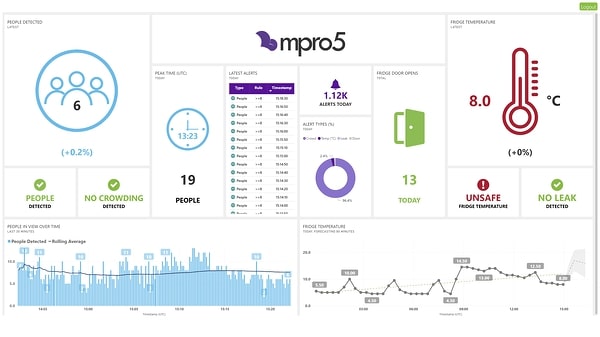5 ways IoT in train stations enhances passenger experience and safety
The Internet of Things (IoT) is becoming prevalent across many different sectors and the rail industry is perfectly placed to leverage this smart...
![]() Facilities Management
Facilities Management
Manage maintenance requests & streamline operations
CMMS
CAFM
EHS
Regulatory Compliance
PPM
EAM
Operations Management
Transportation Management
![]() Food Safety
Food Safety
Prove compliance and ensure standards are up to customer expectations
![]() Retail Task Management
Retail Task Management
Enable your teams to focus on delivering quality and achieve their goals.
Task Creation & Automated Follow-up
Unified Reporting and Data Analysis
Regulatory and Audit Monitoring
Full visibility of every task
IoT
Take action on your data to get ahead
Integrations
Bring mpro5 into your other tools
Automated Workflows
Make your work effortless with automated workflows
Managed Service
Supporting your operations, every step of the way
NEWS & INSIGHTS
Blogs & news
NEWS & INSIGHTS
GET IN TOUCH
GET IN TOUCH
3 min read
 Sam Roberts
:
Oct 7, 2024 12:15:00 AM
Sam Roberts
:
Oct 7, 2024 12:15:00 AM
Today I want to talk about the importance of digitalization in QSRs (Quick Service Restaurants) – the customer experience. If you read about this online, you might get the impression that the only thing QSR’s are focused on is ensuring shorter lines, installing big touch screens and minimizing interaction with staff.
Being able to order delivery from an app or pick-up-and-go is great, but this 99% focus on digital tools for customers misses a key point. If we are talking about the customer experience, we should look at what that journey is like, and not just how they got there.
-jpeg.jpeg?width=335&name=AdobeStock_251554246%20(1)-jpeg.jpeg)
Think about the last time you dined out, or maybe just grabbed a coffee. Whether you remember the rich scent of coffee beans or the incredibly uncomfortable chairs, your senses worked together to create that experience, and things that stand out, good or bad, stick in your brain for a long time.
In particular, it’s the last memorable stimulus that really defines the experience. This is known as the Peak-End rule: people judge an experience based on its most intense point, and its end.
Ideally, you want this peak experience to be the great taste of your food, a friendly member of staff being helpful and the inviting atmosphere.
But, have you ever been into a Costa and felt it was too noisy, or a Nando’s that was too warm, or a McDonald’s that was too bright (metaphorically speaking).
In short, ambient conditions in QSRs matter and this is a critical factor in your decision to come back for more.
-jpeg.jpeg?width=335&name=AdobeStock_330673226%20(1)-jpeg.jpeg)
As you may well know, I’m a sales guy with a focus on digital solutions in retail and hospitality. I’m always trying to work out what value I can bring to a business and recently, to QSRs in particular.
What stands out to me is the evidence of just how potent the ambient conditions can be in a customer journey. For example, there is evidence to suggest that loud noises can suppress your sense of taste, and that the ambient light and temperature can influence buying decisions as well as whether a customer returns to the restaurant.[1]
It’s worth mentioning that there are also more straight-forward but important things to consider: we’ve all used a restaurant bathroom only to discover there is no soap or, worse still, that there is no toilet paper roll – this is definitely a Peak End experience.
You need to be on top of your stocks of consumables, emptying trash bins and wiping down tables, because we all know these can pretty quickly poison the customer experience if it’s not done right.
But on those days when your store is rammed, it can be challenging to balance serving customers and cleaning your bathroom, so how can this be managed?
Much of what I’m saying is, in a way, no news to QSRs – they know what kind of atmosphere they want to ideally create. The question is: how can you monitor these conditions, account for factors outside of your control such as the weather, and get data back on every site?
Where there is a will (or more accurately a sensor), there is a way. Using remote monitoring sensors, you can see everything: lighting levels, noise, temperature and even air quality. These sensors can be connected to your software platform of choice and provide continuous readings through a dashboard. Ideally, you want dashboards for individual sites as well as regional and national overviews.
You can even use sensors to monitor how full your trash cans are, if the bathroom has enough soap, and how many times it has been used over a given period.
What’s more, you can use this data to trigger tasks for staff to complete and send them by email or through a process management app. Automatically let a site know that they need to open a window, turn the music down or put some toilet paper in the bathroom!

The benefits of this system go beyond collecting this data in isolation. Bringing this data into your smart platform of choice, you can surface the data in the aforementioned dashboards and generate reports with relatively minimal effort.
If your smart platform is properly integrated into your tech stack, you’ll be able to compare this data with sales numbers, logbook data (you’ve digitalized this right?), weather information or even macro market data. Only then will you start to get the full picture: properly structured data will encourage and facilitate greater insight into your business, what really has an impact on your customers and what decisions you can make to take your business forwards.
There’s a lot more to digital transformation than being able to order a steak using your phone. It’s about collecting data and what you do with that data to make your customer experience memorable for a good reason rather than a bad one.
https://en.wikipedia.org/wiki/Peak%E2%80%93end_rule
https://www.troldtekt.com/news/themes/restaurants/sound_and_taste/
https://blog.1000bulbs.com/home/the-importance-of-restaurant-lighting
[1] All links are at the bottom of this article
The Internet of Things (IoT) is becoming prevalent across many different sectors and the rail industry is perfectly placed to leverage this smart...
Imagine walking into a store and seeing a mess in the front display units: Shelves are disorganised, stock low and a prior customer abandoned their...
The quick service restaurant (QSR) market is fierce. Customers expect quality food and great service at low prices. And to stay competitive,...